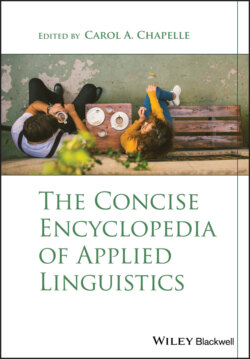Читать книгу The Concise Encyclopedia of Applied Linguistics - Carol A. Chapelle - Страница 134
Phonological Knowledge
ОглавлениеWord form analysis is also necessary for accessing, storing, and manipulating phonological information (Torgesen & Burgess, 1998). Studies involving English‐speaking children have consistently demonstrated that poor readers are handicapped in a variety of phonological tasks; and that their deficiencies tend to be “longitudinally predictive, and relatively unaffected by non‐phonological factors—such as general intelligence, semantic knowledge, or visual processing” (Share & Stanovich, 1995, p. 9). It is agreed that efficiency in phonological decoding is causally related to achievement in word recognition, vocabulary acquisition, and text comprehension.
The primary function of phonological decoding is to enable the child to identify the meaning of printed words through their spoken sounds (Frost, 1998). The importance of efficient decoding is also understood as the means to enhance the functioning of working memory (Kleiman, 1975; Levy, 1975). It has been shown that phonologically encoded information is more durable in working memory than visually encoded information (Gathecole & Baddeley, 1993). Because complex mental operations rely upon working memory, efficient decoding is essential for their execution and completion.
